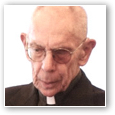The death of civil discourse is the death of us
- FATHER JAMES V. SCHALL, S.J.
"Color" and "niceness" are but a small part of reality. To limit civil discourse to them is itself a failure in civilized discourse.
 In the Wall Street Journal this week, Steve Salerno pointed out the danger in college debates and discussions of making color the only legitimate topic of interest, an endeavor that reduces all other distinctions to one. This approach is just the opposite of the cult of "niceness," in which no stand can be taken on anything because personal "feelings" are held to be more important than argument and truth.
In the Wall Street Journal this week, Steve Salerno pointed out the danger in college debates and discussions of making color the only legitimate topic of interest, an endeavor that reduces all other distinctions to one. This approach is just the opposite of the cult of "niceness," in which no stand can be taken on anything because personal "feelings" are held to be more important than argument and truth.
Indeed, truth becomes nothing but "How do I feel about this or that?" Each of these approaches — 1. only color matters; 2. be nice at any cost — has the same presupposition: The proper definition of man does not include the capacity to reason. In effect, each argues that it is reasonable not to be reasonable. Ultimately, both end up advocating or relying on force as the sole practical arbiter of public controversy.
The purpose of weapons, as well as the purpose of words, is that things might best be decided by civil discourse in the light of a standard that cannot be denied and that does not waver. Rules of persuasion, as well as rules of combat, are designed to facilitate and resolve issues among citizens who agree on a basic constitution that provides proper fora wherein the myriads of ideas and proposals that seek to actualize the human good that is found among this or that people.
In this New Year, we hear much about things like "fake news," media bias, even lying, perjury, and deliberate deception. An epidemic of shouting and yelling-down normal discourse seems to have replaced any pretense at sober consideration of issues based on some grounded judgments about what is feasible for human beings in particular circumstances.
We are said to live in a value-less society in which everyone is free to create his own principles or insist on the primacy of his own feelings. Yet we instinctively recognize that no one really ought to lie either to others or to himself. When headlines blare that some official, film star, or cleric has been lying, no one thinks, if true, that it is a compliment. If lying were not considered important, it would not be in the headlines. Everyone recognizes that the purpose of any proper investigation of human moral disorders is the truth of the matter at hand. If we really recognized no values beyond ourselves, we could have no complaints against lying or any other vice for that matter. And what is lying but the deliberate concealing of the truth when we are required to make it manifest.
The very goal of education was once said to be precisely this "eloquence," this ability to speak well.
Each human being notices in himself that he is endowed with the power of speech. He can also grunt, growl, and screech, if he chooses. This speaking aspect of the human being, of course, is not the only important thing about him — he can walk, see, smell, taste, and touch. But without some connection between the powers of hearing, speaking, and mind, no human being could get outside of himself.
Speech, moreover, is related to the primary faculty, reason, that distinguishes human beings from other creatures with sensory powers. Indeed, speech is that capacity in human beings that makes it possible for what is inside of them to be expressed to others who are also capable of grasping what is in someone else's mind. This power of speech and its relation to other aspects of the whole of the human being are already there. We learn how to speak by acquiring one or more languages. But we do not "learn" that we have the power of speech. It is given to us by whatever gives us what we are, neither gods nor animals.
Eloquence means the ability to speak persuasively, movingly. To persuade also includes an understanding of logic and metaphysics, of mind and being. To refer to "color" or "niceness" as our sole criterion of worth almost always indicates a failure in logic and metaphysics.
Eloquence is not just bare reason, but reason placed in a setting whereby the whole attention of the listener is engaged. The very goal of education was once said to be precisely this "eloquence," this ability to speak well. This latter capacity is more of an art; something learned with practice and insight. It has its classical teachers like Cicero and Burke. Eloquence does not let everyone know everything that goes on in our souls. It is an effort to move souls by the reality of spoken truth, well argued.
We can speculate about eloquence that surpasses the context in which it first appeared. We think, among others, of the Funeral Address of Pericles, of Henry's speech on the eve of St. Crispin's day, of Lincoln at Gettysburg, and Churchill at his "darkest hour." We recognize in them "civilized discourse." We wonder if students at any of our schools ever hear, let alone memorize, any of these addresses that reach the heart of what it is to be human in this world. Such discourse recalls the fact that things must be upheld, defended, and preserved. Other things must be rejected in the very name of what it is to be a rational being.
"Color" and "niceness" are but a small part of reality. To limit civil discourse to them is itself a failure in civilized discourse.
 This is Meaghen Gonzalez, Editor of CERC. I hope you appreciated this piece. We curate these articles especially for believers like you.
This is Meaghen Gonzalez, Editor of CERC. I hope you appreciated this piece. We curate these articles especially for believers like you.
Please show your appreciation by making a $3 donation. CERC is entirely reader supported.

Acknowledgement
 Father James V. Schall, S.J. "The death of civil discourse is the death of us." The Hill (January 4, 2018).
Father James V. Schall, S.J. "The death of civil discourse is the death of us." The Hill (January 4, 2018).
Reprinted with permission of the author.
The Author

 James V. Schall, S.J. 1928-2019, who served as a professor at Georgetown University for thirty-five years, was one of the most prolific Catholic writers in America. Among his many books are On Islam: A Chronological Record, 2002-2018, Reasonable Pleasures: The Strange Coherences of Catholicism, The Mind That Is Catholic: Philosophical & Political Essays, On the Unseriousness of Human Affairs: Teaching, Writing, Playing, Believing, Lecturing, Philosophizing, Singing, Dancing; Roman Catholic Political Philosophy; The Order of Things; The Life of the Mind: On the Joys and Travails of Thinking; Another Sort of Learning, Sum Total Of Human Happiness, and A Student's Guide to Liberal Learning.
James V. Schall, S.J. 1928-2019, who served as a professor at Georgetown University for thirty-five years, was one of the most prolific Catholic writers in America. Among his many books are On Islam: A Chronological Record, 2002-2018, Reasonable Pleasures: The Strange Coherences of Catholicism, The Mind That Is Catholic: Philosophical & Political Essays, On the Unseriousness of Human Affairs: Teaching, Writing, Playing, Believing, Lecturing, Philosophizing, Singing, Dancing; Roman Catholic Political Philosophy; The Order of Things; The Life of the Mind: On the Joys and Travails of Thinking; Another Sort of Learning, Sum Total Of Human Happiness, and A Student's Guide to Liberal Learning.




